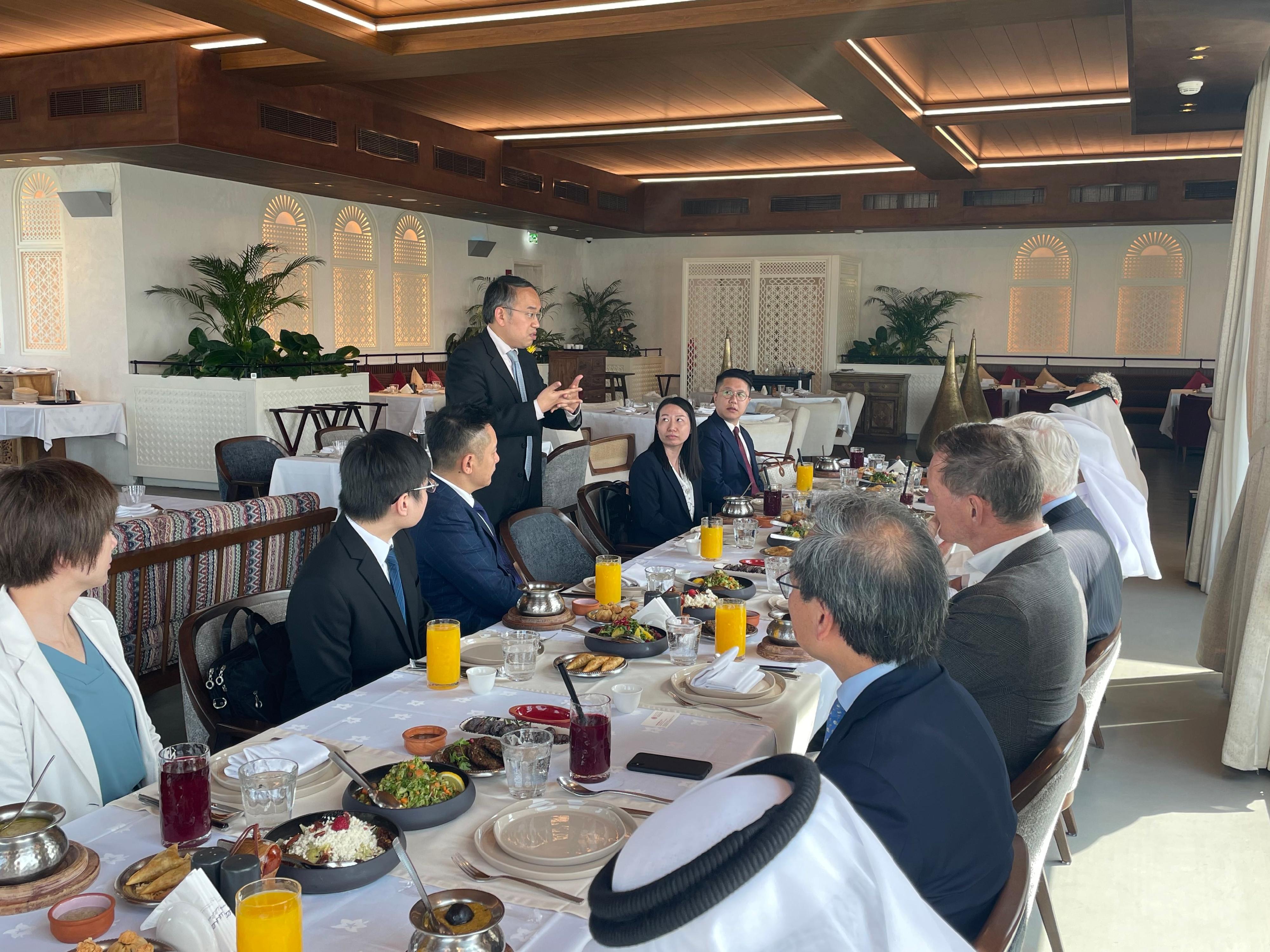SFST's speech at luncheon hosted by Qatar Financial Centre in Doha, Qatar (English only) (with photo)
******************************************************************************************
Yousuf (Chief Executive Officer of Qatar Financial Centre, Mr Yousuf Mohamed Al-Jaida) and distinguished guests,
Good afternoon. First of all, many thanks to the Qatar Financial Centre (QFC) for hosting the lunch for me today. As an onshore business and financial centre located in Doha, the QFC offers a facilitating and pro-growth legal, regulatory, tax and business environment. It contributes to the goals of economic development and diversification as outlined by Qatar National Vision 2030, the blueprint for the country's economic, human, social, and environmental development.
I note that the financial services sector is one of the major contributors to Qatar's economy. Last year, it contributed 8 per cent of GDP (Gross Domestic Product), and ranked second after the hydro-carbon industry. There were many notable achievements for the financial services sector in Qatar over the years, for example the launch of the first Renminbi (RMB) clearing centre in the Middle East region back in 2015. The launch allowed financial institutions in Qatar to access Mainland China's onshore RMB and foreign exchange markets, thereby fostering the use of RMB for cross-border investments and financing. Also, it promotes greater trade and economic links between Mainland China and the Middle East region, paving the way for better financial co-operation and enhancing the role of Qatar as the financial hub in the region.
That brings me to the first co-operation opportunity I see between Hong Kong and Qatar regarding RMB internationalisation. Hong Kong is the leader in offshore RMB businesses and we have the largest offshore liquidity pool standing at around RMB1 trillion, and we also take the top position in terms of handling RMB global payments. As the usage of RMB for trade settlement continues to gain momentum between Mainland China and the Middle East region, the demand for RMB investment products and related solutions in this part of the globe will certainly increase, and the mature RMB ecosystem in Hong Kong will definitely come into play to serve Qatar and other Middle East countries. This is especially relevant to Qatar as the country's largest trading partner is Mainland China. As governments, corporates and investors in the Middle East region accumulate more RMB and look for investment opportunities, Hong Kong can provide access to the Mainland onshore equity and bond markets via the well-established capital market access schemes including the Stock Connect and Bond Connect. As for offshore RMB investment offerings in Hong Kong, we also have a complete suite of products covering offshore debts, exchange-traded funds (ETFs), and the recently launched RMB trading counters for companies listed in our stock exchange, etc. To further explore the potential from these opportunities, I very much look forward to continuing to cultivate and deepen the connections between the governments, financial institutions and corporates between Qatar and Hong Kong.
The second co-operation opportunity I see is on fintech. I note that Invest Qatar pioneered the Qatar Fintech Hub (QFTH) and it is dedicated to offer Qatar's first ever specialised incubator and accelerator programme, which target entrepreneurs with innovative and cutting-edge fintech ideas. The hub complements the country's efforts to develop a robust and globally competitive fintech ecosystem, aligning with the priorities of Qatar National Vision 2030. In this regard, Hong Kong also has a very vibrant and dynamic fintech ecosystem, with over 800 companies and start-ups, providing an array of services in mobile payment, cross-boundary transfer, intelligent financial consultancy, wealth management and blockchain, etc. We also have a number of well-developed fintech financial infrastructures, including the Faster Payment System (FPS) providing round-the-clock and instant settlement of payment, and the Commercial Data Interchange (CDI) which facilitates trade financing particularly for small and medium enterprises through sharing of their business data with banks. With our shared advantages in cultivating innovations and gathering global talent, we can foster collaborations between the fintech companies in Qatar and Hong Kong for business expansion, and share knowledge for developing efficient and widely adopted financial infrastructures.
To conclude, there is a world of opportunities in Hong Kong available to Qatari businesses and investors, from RMB internationalisation, fintech to other areas of financial services. Qatari financial institutions and corporates could leverage Hong Kong's unique advantages under the "one country, two systems" principle, strategic location at the doorstep of Mainland China, as well as our world-class infrastructure and rich pool of professionals, to tap into the vast opportunities arising from our market and the Greater Bay Area. I look forward to continuing our dialogue and exchanges to foster more mutually beneficial collaborations between Qatar and Hong Kong. Thank you.
Ends/Thursday, September 21, 2023
Issued at HKT 19:45
Issued at HKT 19:45
NNNN



